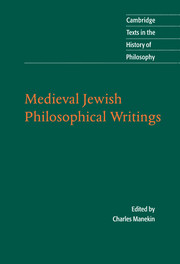Book contents
- Frontmatter
- Contents
- Introduction
- Chronology
- Further reading
- Note on the texts and translations
- 1 Saadia Gaon, from The Book of the Beliefs and Convictions
- 2 Solomon ibn Gabirol and Shem Tov b. Joseph Falaquera, Excerpts from “The Source of Life”
- 3 Moses Maimonides, from The Guide of the Perplexed
- 4 Isaac Albalag, from The Emendation of the “Opinions”
- 5 Moses of Narbonne (Narboni), The Treatise on Choice
- 6 Levi Gersonides, from The Wars of the Lord
- 7 Ḥasdai Crescas, from The Light of the Lord Treatise Two
- 8 Joseph Albo, from The Book of Principles
- Index
- CAMBRIDGE TEXTS IN THE HISTORY OF PHILOSOPHY
5 - Moses of Narbonne (Narboni), The Treatise on Choice
Published online by Cambridge University Press: 05 June 2012
- Frontmatter
- Contents
- Introduction
- Chronology
- Further reading
- Note on the texts and translations
- 1 Saadia Gaon, from The Book of the Beliefs and Convictions
- 2 Solomon ibn Gabirol and Shem Tov b. Joseph Falaquera, Excerpts from “The Source of Life”
- 3 Moses Maimonides, from The Guide of the Perplexed
- 4 Isaac Albalag, from The Emendation of the “Opinions”
- 5 Moses of Narbonne (Narboni), The Treatise on Choice
- 6 Levi Gersonides, from The Wars of the Lord
- 7 Ḥasdai Crescas, from The Light of the Lord Treatise Two
- 8 Joseph Albo, from The Book of Principles
- Index
- CAMBRIDGE TEXTS IN THE HISTORY OF PHILOSOPHY
Summary
The Treatise on Choice by Moses of Narbonne, which he composed about three months before his death.
I looked about and saw that a scholar, one of the distinguished of his generation (and whom I encountered towards the end of his life), composed the Letter on the Decree. He maintained therein that the possible does not exist, that everything is necessitated, and that everything is predestined by Divine decree. In a word, he said that the early authorities recognized this proposition as true, but that they concealed it so as not to annul the nature of endeavor. He also claimed that although everything is necessitated, [this does not imply that] intermediate causes are to be annulled; rather it is necessary to endeavor to achieve the desired result. For the result, though predestined, comes about through endeavor and application. He explained that he was led to affirm both propositions because when the sage proclaimed “If the Decree is true, endeavor is futile” he meant endeavor on behalf of the contrary result rather than on what has been predestined. This is the gist of his remarks in the letter he composed on the topic. Although he went on at length embellishing his thesis and eliminating its implausibility, this is the substance of his comments.
Now I say that the first principle is absurd, because it is not the case that everything is predestined. But if it were true, then his premises would contradict one another.
- Type
- Chapter
- Information
- Medieval Jewish Philosophical Writings , pp. 143 - 152Publisher: Cambridge University PressPrint publication year: 2008

